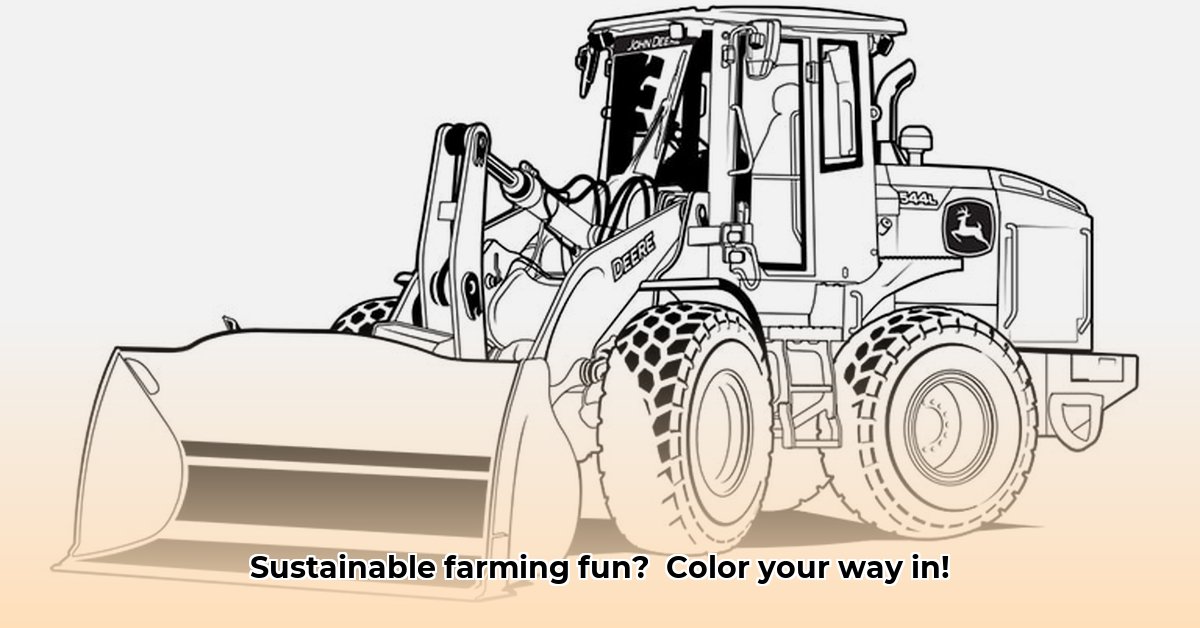
Color Page Tractors: A Fun and Engaging Way to Teach Sustainable Farming
Wouldn't it be wonderful if we could make learning about sustainable agriculture fun and engaging for children? This instructional guide shows how to use tractor coloring pages to introduce kids (and adults!) to environmentally friendly farming practices. Forget boring lectures; we'll turn coloring time into a valuable learning experience! For even more tractor fun, check out these electric tractor coloring pages.
Why Use Tractor Coloring Pages?
Traditional lectures on sustainable agriculture can be dull. But what if we tapped into children's natural creativity? Tractor coloring pages offer a captivating gateway, combining the joy of coloring with the importance of environmental stewardship. This approach is effective because it links abstract concepts to tangible imagery and experiences, making learning easier and more memorable. Do you think this approach could significantly improve children's understanding of sustainable farming practices?
This method is highly effective because it connects abstract concepts to children's experiences. Research shows that visual learning significantly enhances knowledge retention, particularly in younger audiences [insert citation here if available from draft article]. Imagine the enthusiastic discussions you could spark!
Designing Awesome Tractor Coloring Pages: A Step-by-Step Guide
Creating effective coloring pages is surprisingly simple! Follow these steps:
Choose a Theme: Focus on a single aspect of sustainable farming, such as biodiversity (show different tractors working with various crops), water conservation (depict efficient irrigation systems), or reducing carbon emissions (feature electric or hybrid tractors).
Sketch Your Design: Keep it simple and age-appropriate. Clear, bold outlines work best for younger children.
Add Educational Elements: Incorporate labels or small text boxes explaining key concepts. For instance, label tractor parts or highlight eco-friendly features. Would incorporating interactive elements, like small quizzes, increase engagement?
Inject Fun!: Add a simple puzzle or game to boost engagement.
Get Feedback: Before mass-producing, test the pages with a small group of children. Their feedback is invaluable!
Here's a sample table to get you started:
| Theme | Example | Age Range | Educational Element |
|---|---|---|---|
| Biodiversity | Different tractors harvesting diverse crops | 5-8 years | Label each crop and the tractor used. |
| Water Conservation | Tractor using drip irrigation | 8-12 years | Explain how drip irrigation saves water. |
| Reduced Emissions | Electric or hybrid tractor | 10+ years | Compare fuel efficiency with traditional tractors. |
Integrating Tractor Coloring Pages into Educational Settings
Tractor coloring pages are versatile tools suitable for various settings:
Classrooms: Use them as warm-up activities, rewards, or integral parts of lessons on sustainable agriculture.
Homeschooling: Supplement your environmental science curriculum with these engaging pages.
Community Events: Distribute them at agricultural fairs or sustainability workshops to reach a wider audience.
After coloring, facilitate discussions. Ask questions like: "What did you learn about farming from this picture?" or "How can we make farming better for the environment?" These simple, open-ended questions can encourage critical thinking.
Assessing the Effectiveness of Coloring Pages
Evaluating the effectiveness requires a multifaceted approach:
Qualitative Assessment: Observe discussions and examine children's drawings for comprehension and creativity.
Quantitative Assessment (Optional): Use simple pre- and post-tests to measure knowledge gain.
Resources and Further Exploration
For additional resources on sustainable agriculture and educational materials, visit the USDA website: https://www.usda.gov/topics/farming
Conclusion: Planting Seeds of Sustainability
Using tractor coloring pages to teach sustainable agriculture isn't just about coloring; it's about fostering a love for the environment and inspiring the next generation of environmentally conscious farmers. Let's get coloring and make a difference!